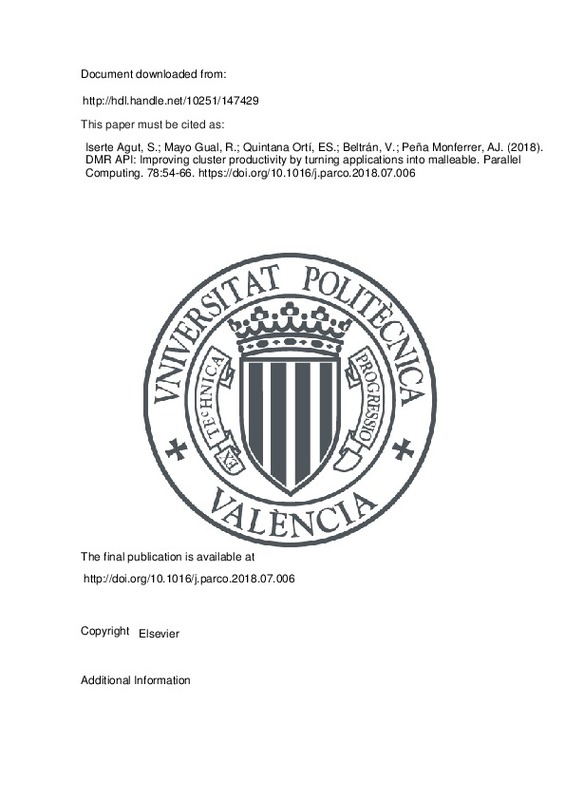JavaScript is disabled for your browser. Some features of this site may not work without it.
Buscar en RiuNet
Listar
Mi cuenta
Estadísticas
Ayuda RiuNet
Admin. UPV
DMR API: Improving cluster productivity by turning applications into malleable
Mostrar el registro sencillo del ítem
Ficheros en el ítem
| dc.contributor.author | Iserte Agut, Sergio
|
es_ES |
| dc.contributor.author | Mayo Gual, Rafael
|
es_ES |
| dc.contributor.author | Quintana Ortí, Enrique Salvador
|
es_ES |
| dc.contributor.author | Beltrán, Vicenç
|
es_ES |
| dc.contributor.author | Peña Monferrer, Antonio José
|
es_ES |
| dc.date.accessioned | 2020-07-04T03:32:04Z | |
| dc.date.available | 2020-07-04T03:32:04Z | |
| dc.date.issued | 2018 | es_ES |
| dc.identifier.issn | 0167-8191 | es_ES |
| dc.identifier.uri | http://hdl.handle.net/10251/147429 | |
| dc.description.abstract | [EN] Adaptive workloads can change on-the-fly the configuration of their jobs, in terms of number of processes. To carry out these job reconfigurations, we have designed a methodology which enables a job to communicate with the resource manager and, through the runtime. to change its number of MPI ranks. The collaboration between both the workload manager-aware of the queue of jobs and the resources allocation-and the parallel runtime-able to transparently handle the processes and the program data-is crucial for our throughput-aware malleability methodology. Hence, when a job triggers a reconfiguration, the resource manager will check the cluster status and return the appropriate action: i) expand, if there are spare resources; ii) shrink, if queued jobs can be initiated; or iii) none, if no change can improve the global productivity. In this paper, we describe the internals of our framework and demonstrate how it reduces the global workload completion time along with providing a more efficient usage of the underlying resources. For this purpose, we present a thorough study of the adaptive workloads processing by showing the detailed behavior of our framework in representative experiments. (C) 2018 Elsevier B.V. All rights reserved. | es_ES |
| dc.language | Inglés | es_ES |
| dc.publisher | Elsevier | es_ES |
| dc.relation.ispartof | Parallel Computing | es_ES |
| dc.rights | Reconocimiento - No comercial - Sin obra derivada (by-nc-nd) | es_ES |
| dc.subject | MPI malleability | es_ES |
| dc.subject | Job reconfiguration | es_ES |
| dc.subject | Dynamic reallocation | es_ES |
| dc.subject | Smart resource utilization | es_ES |
| dc.subject | Adaptive workload | es_ES |
| dc.subject.classification | ARQUITECTURA Y TECNOLOGIA DE COMPUTADORES | es_ES |
| dc.title | DMR API: Improving cluster productivity by turning applications into malleable | es_ES |
| dc.type | Artículo | es_ES |
| dc.identifier.doi | 10.1016/j.parco.2018.07.006 | es_ES |
| dc.relation.projectID | info:eu-repo/grantAgreement/EC/H2020/749516/EU/Advanced Ecosystem for Broad Heterogeneous Memory Usage/ | es_ES |
| dc.relation.projectID | info:eu-repo/grantAgreement/MINECO//TIN2014-53495-R/ES/COMPUTACION HETEROGENEA DE BAJO CONSUMO/ | es_ES |
| dc.relation.projectID | info:eu-repo/grantAgreement/MINECO//TIN2015-65316-P/ES/COMPUTACION DE ALTAS PRESTACIONES VII/ | es_ES |
| dc.rights.accessRights | Abierto | es_ES |
| dc.contributor.affiliation | Universitat Politècnica de València. Departamento de Informática de Sistemas y Computadores - Departament d'Informàtica de Sistemes i Computadors | es_ES |
| dc.description.bibliographicCitation | Iserte Agut, S.; Mayo Gual, R.; Quintana Ortí, ES.; Beltrán, V.; Peña Monferrer, AJ. (2018). DMR API: Improving cluster productivity by turning applications into malleable. Parallel Computing. 78:54-66. https://doi.org/10.1016/j.parco.2018.07.006 | es_ES |
| dc.description.accrualMethod | S | es_ES |
| dc.relation.publisherversion | http://doi.org/10.1016/j.parco.2018.07.006 | es_ES |
| dc.description.upvformatpinicio | 54 | es_ES |
| dc.description.upvformatpfin | 66 | es_ES |
| dc.type.version | info:eu-repo/semantics/publishedVersion | es_ES |
| dc.description.volume | 78 | es_ES |
| dc.relation.pasarela | S\381210 | es_ES |
| dc.contributor.funder | European Regional Development Fund | es_ES |
| dc.contributor.funder | Ministerio de Economía y Competitividad | es_ES |







![[Cerrado]](/themes/UPV/images/candado.png)

